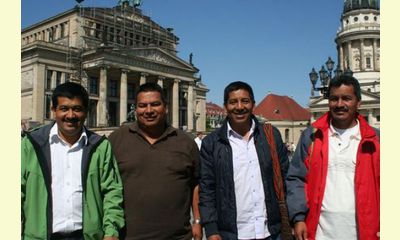|
|
Colombia: The Indigenous of Cauca: "We are peoples with a culture of peace"
an article by Eva Usi, Deutsche Welle (abridged)
Drug violence, paramilitaries and guerrillas threaten the indigenous peoples of Cauca. Add to that the dispute over natural resources. To seek alliances for their struggle, their leaders have come to Europe.

Representatives of the Regional Indigenous Council of the Cauca
click on photo to enlarge
Representatives of the Regional Indigenous Council of Cauca (CRIC ), Colombia, came to Germany on a European tour with the aim of strengthening alliances. The oldest Indian organization of Colombia and Latin America, representing ten indigenous peoples, is reviving the strength of the indigenous movement in Colombia and seeking allies to address the many threats facing their communities.
The tour of the four indigenous leaders began in Norway, where they arrived at the invitation of the University of Oslo where they strengthened their ties with the Sami indigenous people of Norway, with its own culture, language and customs. After Germany, their tour will take them to the Netherlands and Spain, just prior to the Colombian presidential elections which are scheduled for May 25, and which President Juan Manuel Santos aspires to be re-elected. Organizations such as Amnesty International have urged the election candidates to protect the civilian population, especially the most vulnerable groups and communities, who are vulnerable to abuse and violations of their rights.
Cauca, in the southwest of Colombia, is one of the 32 departments that make up the Colombian territory. . . "We live in a strategic, resource-rich area, abundant with moorland, lakes and snowy areas. There is great mineral wealth, and for this they want us to get off the ridge so they can strip us of our ancestral territories. This great dispute pits on one side the neoliberal economic model followed by our government and on the other side, farmers, indigenous and Afro-descendants who need the land,"explained Eduardo Camayo, leader of the Western Region and Director of the CRIC region, supported by the 121 Cauca indigenous authorities . Some 300,000 Indians belonging to ten different people have been living in the area since pre-Hispanic times. . .
During a debate held yesterday [April 29] in the American Institute of Berlin , indigenous leaders explained that their struggle has cost many dead and they indicated that they will continue mobilizing and seeking cooperation with other social movements in Colombia and other countries. They also reiterated their desire for official recognition of Indigenous Intercultural University EBI , which has been denied by the Colombian government. "We want our own doctors and engineers ," said José Vicente Otero. . .
Eduardo Camayo believes that sooner or later indigenous peoples will be recognized as the true guardians of nature. Camayo demand a change in economic policy. "The energy and mining policy that the government has implemented was not consulted with the people in Colombia and as a result we are delivering our natural resources to multinationals. The government forgot that Colombians have to eat" . .
The leader emphasized that the Constitution gives them rights, but they continue to be violated. "The Constitution guarantees that our territories are autonomous, politically organized , we have own authorities, customs and a particular worldview ," Otero says and adds, "We survived by struggle, but we are peoples with a culture of peace.
(Click here for a Spanish version of this article)
|








|
DISCUSSION
Question(s) related to this article:
Indigenous peoples, Are they the true guardians of nature?
* * * * *
Latest reader comment:
This discussion question applies to the following articles:
Indígenas del Cauca: “Somos pueblos de cultura de paz”
Colombia: The Indigenous of Cauca: "We are a people with a culture of peace"
Unidos, Jamas Seremos Vencidos: La Victoria de de Guatemala En Contra de Monsanto
United, We Will Never Be Defeated: Guatemala’s Victory Over Monsanto
Confederación Campesina del Perú presente en marcha de Cumbre de Pueblos
People's Summit in Peru: “The Earth is burning, let´s change the system!”
Canada: Kinder Morgan leaves Burnaby Mountain in win for pipeline protesters
Los indígenas de Brasil consiguen una victoria territorial a escala nacional
Brazilian Indians secure nationwide land victory
Mining interests in Guatemala challenged by indigenous direct democracy
Mayan People’s Movement Defeats Monsanto Law in Guatemala
Terrace Farming – an Ancient Indigenous Model for Food Security
Indigenous Elders Send Stern Message to UN Paris Delegates: Preventing 2°C Is Not Nearly Enough
On remote Philippine island, female forest rangers are a force to be reckoned with
USA: Standoff at Standing Rock: Even Attack Dogs Can’t Stop the Native American Resistance
Le Congrès de l’UICN stimule les droits des peuples autochtones
El Congreso de la UICN refuerza el apoyo a los derechos de los pueblos indígenas
IUCN Congress boosts support for Indigenous peoples’ rights
USA: Update from Standing Rock
Colombia: When indigenous knowledge heals and prevents the wounds of war
16 Days of Activism: Meet Anne Marie Sam, Canada
16 Days of Activism: Meet Bertha Zúñiga Cáceres, Honduras
For more recent articles, click here

|
|









